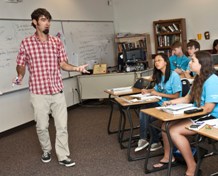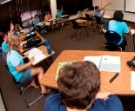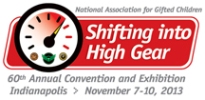
|
|
|
|
Featured
Topic | Resources |
Headlines |
Davidson Institute Updates |
Gifted News
|
|
Featured
Topic
|
| |
Welcome
During the past few weeks, misdiagnosis of gifted children has been
featured in multiple news outlets thanks to the efforts
of Supporting Emotional Needs of the Gifted (SENG) and their
Misdiagnosis Initiative. Misdiagnosis is still not widely understood, causing unnecessary frustration and silently sabotaging efforts to nurture young
people. Professionals who support
gifted young people can learn more about misdiagnosis and its effects on
this population in
the following Q&A with Marianne Kuzujanakis, who serves
on the SENG board of directors.
Please contact us at
edguild@davidsongifted.org if we can provide additional information. The Educators Guild team is always happy to
help!
 Guest
Q&A Guest
Q&A
A pediatrician with a master's degree in public health from
Harvard School of Public Health, Marianne Kuzujanakis, MD,
MPH serves as a director of SENG and a co-founder of the SENG Misdiagnosis Initiative,
as well as a homeschool educator.
What is meant by misdiagnosis?
Misdiagnosis is a mismatch between the child’s actual learning and health needs and the perception of those needs by others (teachers, medical professionals, other adults). Sometimes this mismatch results in either a health disorder or learning need being overlooked. At other times this mismatch results in a labeled mental health or learning disorder being erroneously placed upon a child. Specifically for the gifted child, this often means being misunderstood and not supported for one’s actual needs - including giftedness.
What are the types of misdiagnosis in the gifted student population?
The combination of a gifted child in a school setting can pose a variety of challenges that can lead the child to exhibit inappropriate behaviors that can be misinterpreted. Gender, age, and personality all may play roles in the expression of these behaviors as well as in how these behaviors are interpreted by others. The most commonly seen types of misdiagnosis in gifted students include the over-diagnosis of Attention Deficit Hyperactivity Disorder (ADHD), Autism
Spectrum Disorder, Bipolar disorders, Obsessive Compulsive Disorder
(OCD), and Oppositional Defiant Disorder (ODD). Missed
diagnosis (under-diagnosis) in gifted children may occur for
these same conditions when giftedness over-compensates for
the weakness.
An evaluation, preferentially by someone trained and experienced in both giftedness and dual diagnosis, is crucial to distinguish giftedness from learning and behavioral conditions requiring treatment. The
range of testing is wide and usually falls into categories of intelligence, achievement, and the more comprehensive neuropsychological testing that can better evaluate parameters like executive functioning. A trained specialist will be able to pick up subtle findings indicating a masked disorder or a missed diagnosis of giftedness. These same specialists may also offer individual or family counseling, educational planning, and any necessary referrals for treatment if a dual diagnosis is found.
What are the signs educators need to look for regarding misdiagnosis?
If educators see an unevenness in a student’s academic abilities, there is always a possibly that there is an overlooked weakness that needs identification. Other clues may point to misdiagnosis as well. For example, is the student repeatedly unhappy  in school? Does the student seem to have a poor self-opinion? Is he/she a harsh critic of making mistakes to the point where the student avoids challenges or doesn’t accept even the slightest constructive criticism? Does the student over-react and become easily frustrated? Is it typical to hear of the student “not working at potential”? in school? Does the student seem to have a poor self-opinion? Is he/she a harsh critic of making mistakes to the point where the student avoids challenges or doesn’t accept even the slightest constructive criticism? Does the student over-react and become easily frustrated? Is it typical to hear of the student “not working at potential”?
It is beneficial if teachers regularly communicate on shared students. A student who begins the school year eager to learn, but shortly thereafter seems to shut down his/her enthusiasm may possibly be a gifted student who for a myriad of reasons may be underachieving and hiding his/her giftedness. One such reason may simply be to “fit in” with the other classmates, when the student cannot either find intellectual age peers, or feels ostracized by classmates due to his/her intellectual strengths.
What should educators do if they suspect a student has been misdiagnosed?
If a misdiagnosis is suspected, one of the first things an educator should do is speak with the parents about what the student is like at home. Periodic checks about home environment, changes, and stressors may help better understand a student’s progress. Everything in a student’s environment may be a clue in assessing a student’s academic abilities and social/emotional health.
Educators
must work in equal partnership with parents to bring
together the best opportunities for student success by
identifying and supporting both strengths and weaknesses.
Addressing whether the student’s educational placement is
appropriate and sufficiently challenging is an often
overlooked and necessary first step. Educators may also wish
to meet regularly with the school psychologist to discuss
students who are puzzling to understand.
Teachers and school psychologists may both wish to periodically participate in yearly gifted conferences
or online gifted-related seminars are also available from organizations like SENG and NAGC.
It is critical that proper gifted student support involve a thorough education of teachers and psychologists and medical professionals in the triad of giftedness, misdiagnosis, and dual diagnosis.
For the entire text of Dr. Kuzujanakis's interview, please
click here to read this Davidson Gifted Database article.
|
|
|
|
Resources
|
| |
Additional resources related to misdiagnosis:
|
|
|
|
In
the News
|
|
|
|
Davidson
Institute Updates
|
| |
Davidson Institute for Talent Development and University of Nevada, Reno Offer Online Class in Gifted Education
 The Davidson Institute for Talent Development and University of Nevada, Reno have partnered to offer
an online course, EDSP 723 - Education for the Gifted. This three-credit, graduate-level class, which will run from June 10 to August 9, 2013, is designed to introduce key concepts of gifted education to teachers in order to help them better serve the gifted population. Some of the topics examined will include identification, characteristics, gifted definitions and myths about gifted education. The Davidson Institute for Talent Development and University of Nevada, Reno have partnered to offer
an online course, EDSP 723 - Education for the Gifted. This three-credit, graduate-level class, which will run from June 10 to August 9, 2013, is designed to introduce key concepts of gifted education to teachers in order to help them better serve the gifted population. Some of the topics examined will include identification, characteristics, gifted definitions and myths about gifted education.
Teachers, school administrators and anyone interested in effectively serving the gifted population are encouraged to attend. Out-of-state students pay the same rate as residents during Summer Session
and all students are required to register with the University of Nevada, Reno. EDSP 723 will be taught by gifted education specialists from the Davidson Institute.
For more information, please
click here or call Online Learning at 775-784-4652. This course is limited to 25 students and the deadline to register is June 7 – if interested, please begin the registration process today!
Educators Guild Discussion Group on Facebook
 All educators, and people interested in gifted education, are invited to join the
Educators Guild Discussion Group on Facebook and contribute to the ongoing conversation about how to best serve the academic needs of our nation’s brightest students. All educators, and people interested in gifted education, are invited to join the
Educators Guild Discussion Group on Facebook and contribute to the ongoing conversation about how to best serve the academic needs of our nation’s brightest students.
 Davidson Young
Scholars Davidson Young
Scholars
The
Davidson Young Scholars program provides FREE services designed to nurture and support profoundly gifted young people and their families, including talent development and educational advocacy, an online community, annual get-togethers, and the Ambassador Program. Applications are due the first of each month. For more information, see the
How to Apply and
Qualification Criteria pages. |
|
|
|
Gifted
News
|
| |
National Association for Gifted Children – New Administrator Toolbox
 With short videos, factsheets, diagrams and a program evaluation checklist, the
National Association for Gifted Children (NAGC) recently launched a new webpage for school district leaders and administrators across the nation to help them better serve high-ability learners. Called the
Administrator Toolbox, these free resources were compiled by NAGC’s Administrator Task Force due to the increasing number of requests from administrators and to help them with briefing materials about gifted education, and tools to advocate and implement services for gifted students. Source:
Education Week Teacher With short videos, factsheets, diagrams and a program evaluation checklist, the
National Association for Gifted Children (NAGC) recently launched a new webpage for school district leaders and administrators across the nation to help them better serve high-ability learners. Called the
Administrator Toolbox, these free resources were compiled by NAGC’s Administrator Task Force due to the increasing number of requests from administrators and to help them with briefing materials about gifted education, and tools to advocate and implement services for gifted students. Source:
Education Week Teacher
NAGC 2013 National Convention
 With
hundreds of content-rich sessions on a range of
issues related to gifted education, the 60th annual
NAGC Convention,
Nov. 7 through Nov. 10 in Indianapolis, Ind. provides an
excellent opportunity to learn alongside, and network with,
colleagues. At each presentation, parents, educators and
those interested in gifted education will be provided with
“take-away” tools and classroom resources. With
hundreds of content-rich sessions on a range of
issues related to gifted education, the 60th annual
NAGC Convention,
Nov. 7 through Nov. 10 in Indianapolis, Ind. provides an
excellent opportunity to learn alongside, and network with,
colleagues. At each presentation, parents, educators and
those interested in gifted education will be provided with
“take-away” tools and classroom resources. |
|
|
|
Closing Thought
|
| |
"Perhaps the biggest risk comes from the gifted child’s high level of intensity and sensitivity. However, these characteristics, often referred to as 'overexcitabilities,' are not necessarily problems. Most often, the problems come because such a child is inappropriately placed in an educational system
. . ."
~ James Webb, in the
Global GTChat article,
The Misdiagnosis Initiative: An Interview with Dr. James Webb
|
|
|
|
If you have information to include in future
Educators Guild Newsletters, please email our EdGuild@DavidsonGifted.org.
If you have been forwarded this newsletter, and wish to receive future editions,
sign-up here. |
|
Davidson Institute for Talent Development
Supporting our nation's brightest young minds.
9665 Gateway Drive, Suite B, Reno, Nevada 89521
Phone: 775-852-3483 Fax: 775-852-2184
Email: EdGuild@davidsongifted.org Web: www.DavidsonGifted.org
www.DavidsonGifted.org/EdGuild.
NOTE: The appearance of selected programs and/or resources in the Davidson Institute's Educators Guild Newsletter does not imply an endorsement or affiliation. Programs and resources are highlighted for informational purposes only.
Visit the Davidson Institute's
Educators Guild Newsletter archive page.



"Like"
the Davidson Institute on
Facebook
and follow us on
Twitter.
The Davidson Institute also has a number of
YouTube videos!
|

 Guest
Q&A
Guest
Q&A  in school? Does the student seem to have a poor self-opinion? Is he/she a harsh critic of making mistakes to the point where the student avoids challenges or doesn’t accept even the slightest constructive criticism? Does the student over-react and become easily frustrated? Is it typical to hear of the student “not working at potential”?
in school? Does the student seem to have a poor self-opinion? Is he/she a harsh critic of making mistakes to the point where the student avoids challenges or doesn’t accept even the slightest constructive criticism? Does the student over-react and become easily frustrated? Is it typical to hear of the student “not working at potential”?
 The Davidson Institute for Talent Development and University of Nevada, Reno have partnered to offer
an online course, EDSP 723 - Education for the Gifted. This three-credit, graduate-level class, which will run from June 10 to August 9, 2013, is designed to introduce key concepts of gifted education to teachers in order to help them better serve the gifted population. Some of the topics examined will include identification, characteristics, gifted definitions and myths about gifted education.
The Davidson Institute for Talent Development and University of Nevada, Reno have partnered to offer
an online course, EDSP 723 - Education for the Gifted. This three-credit, graduate-level class, which will run from June 10 to August 9, 2013, is designed to introduce key concepts of gifted education to teachers in order to help them better serve the gifted population. Some of the topics examined will include identification, characteristics, gifted definitions and myths about gifted education.
 All educators, and people interested in gifted education, are invited to join the
All educators, and people interested in gifted education, are invited to join the
 Davidson Young
Scholars
Davidson Young
Scholars
 With short videos, factsheets, diagrams and a program evaluation checklist, the
With short videos, factsheets, diagrams and a program evaluation checklist, the
 With
hundreds of content-rich sessions on a range of
issues related to gifted education, the 60th annual
With
hundreds of content-rich sessions on a range of
issues related to gifted education, the 60th annual